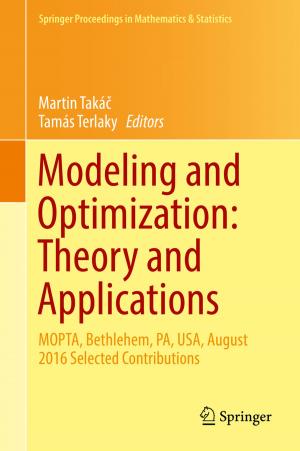Optimization and Its Applications in Control and Data Sciences
In Honor of Boris T. Polyak’s 80th Birthday
Nonfiction, Science & Nature, Mathematics, Applied, Computers, Advanced Computing, Programming, Data Modeling & Design| Author: | ISBN: | 9783319420561 | |
| Publisher: | Springer International Publishing | Publication: | September 29, 2016 |
| Imprint: | Springer | Language: | English |
| Author: | |
| ISBN: | 9783319420561 |
| Publisher: | Springer International Publishing |
| Publication: | September 29, 2016 |
| Imprint: | Springer |
| Language: | English |
This book focuses on recent research in modern optimization and its implications in control and data analysis. This book is a collection of papers from the conference “Optimization and Its Applications in Control and Data Science” dedicated to Professor Boris T. Polyak, which was held in Moscow, Russia on May 13-15, 2015.
This book reflects developments in theory and applications rooted by Professor Polyak’s fundamental contributions to constrained and unconstrained optimization, differentiable and nonsmooth functions, control theory and approximation. Each paper focuses on techniques for solving complex optimization problems in different application areas and recent developments in optimization theory and methods. Open problems in optimization, game theory and control theory are included in this collection which will interest engineers and researchers working with efficient algorithms and software for solving optimization problems in market and data analysis. Theoreticians in operations research, applied mathematics, algorithm design, artificial intelligence, machine learning, and software engineering will find this book useful and graduate students will find the state-of-the-art research valuable.
This book focuses on recent research in modern optimization and its implications in control and data analysis. This book is a collection of papers from the conference “Optimization and Its Applications in Control and Data Science” dedicated to Professor Boris T. Polyak, which was held in Moscow, Russia on May 13-15, 2015.
This book reflects developments in theory and applications rooted by Professor Polyak’s fundamental contributions to constrained and unconstrained optimization, differentiable and nonsmooth functions, control theory and approximation. Each paper focuses on techniques for solving complex optimization problems in different application areas and recent developments in optimization theory and methods. Open problems in optimization, game theory and control theory are included in this collection which will interest engineers and researchers working with efficient algorithms and software for solving optimization problems in market and data analysis. Theoreticians in operations research, applied mathematics, algorithm design, artificial intelligence, machine learning, and software engineering will find this book useful and graduate students will find the state-of-the-art research valuable.















